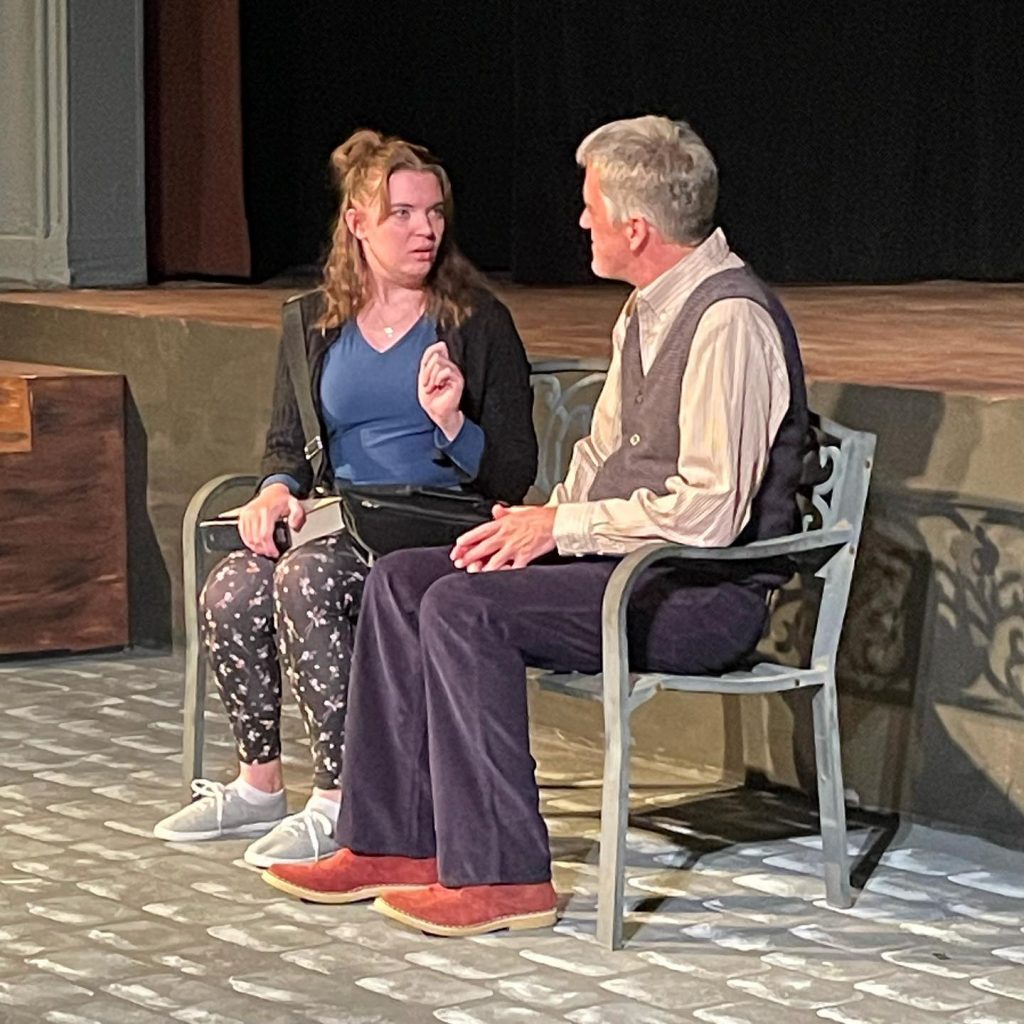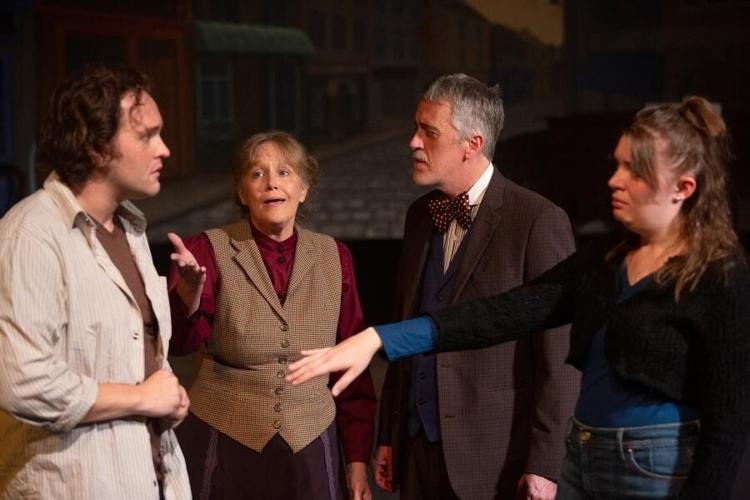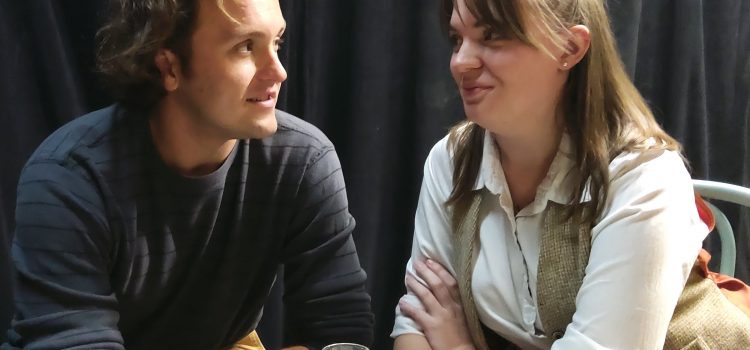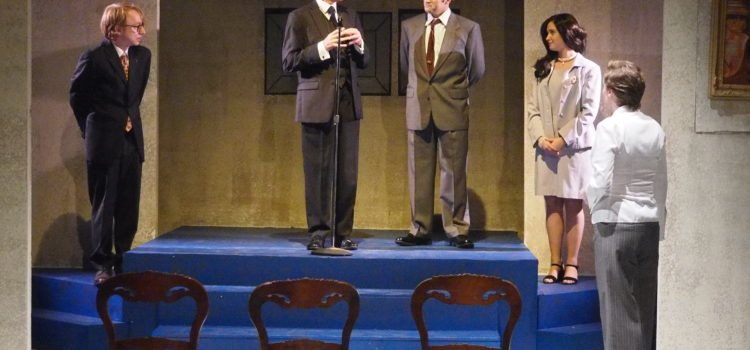By Lynn Venhaus
Set in Dublin, “Bloomsday” is a little charmer that whisks you away to the Emerald Isle in a time travel love story. (Yes, you read that right).
Written by Steven Dietz in 2017, the playwright has an ear for the rhythms of youthful adventurers and the wistful reminiscences of older adults.
“Bloomsday” highlights James Joyce’s use of the Irish capital city’s landmarks during an ordinary June 16 in 1904, the setting for his masterwork novel, “Ulysses,” which was published in 1920.
There is such devotion to the novel that every June 16, fans dress up as characters and celebrate Bloomsday in Dublin, some making a pilgrimage.
With his literary use of modernism, the Irish novelist, short story writer, poet, teacher, and critic is regarded as one of the most influential writers of the 20th century.
The West End Players Guild opened its 110th season with Dietz’s witty drama, which had been postponed from last year during the COVID-19 pandemic lockdown. His play, “This Random World,” was previously performed in the Union Avenue Christian Church basement.
With minimal staging representing several locales, West End is well-suited to produce such an intimate play. The pleasing set design features a view of Dublin’s shops and pubs lining cobblestone streets, with excellent artwork by Marjorie Williamson and Morgan Maul-Smith.
Four endearing performers star as a young couple, Robbie and Caithleen, in scenes from 35 years ago, and as the older Robert and Cait one day last June.

Jeff Lovell, topped with a straw boater hat familiar to Joyce fans, plays the 55-year-old American college professor Robert, whose life changed during one magical day. He was 20 years old and taking a walking tour highlighting James Joyce’s Dublin.
That’s when he met tour guide Caithleen, 20, played with verve by Megan Wiegert. She won Robbie’s heart that day — but he did not take her back to America with him. Why not? The dreamer in her was certainly willing.
Wondering what might have been with “the one who got away” is the focus in this no-frills yet delightful production. The takeaway is to make the most of the present before it is past because we can’t get back lost time.
The cast conveys the urgency to pursue that road less taken so that looking back isn’t such a heartache. Dietz injects humor into the discoveries as the quartet moves back and forth through time, reliving the impetuousness of youth as the older adults look back with regrets and “what ifs.”
Could it still happen after all these years? The older Robert, with the benefit of hindsight, has returned to Dublin for a reunion with Caithleen, who now calls herself “Cait.” However, he finds the spunky young Caithleen instead, having somehow traveled back in time to that only day they spent together. She remains full of wanderlust, and he remembers her attractive qualities.
The young – and directionless — Robbie is played earnestly by an energetic John T. Moore, and the older Robert realizes he should have been more decisive.
Colleen Heneghan is a sweet-natured Cait, playing the spry but aged woman with a twinkle in her eye and a song still in her heart. The yearning to experience all that life offers is still there, although she basically settled for complacency. In her conversations with her younger self, she is surprisingly candid and explains her choices.
Both women have worked to perfect convincing Irish dialects, and those lovely lilts are uplifting.
Costume Designer Tracey Newcomb has outfitted the foursome in suitable attire for travels, age and time periods while Jackie Aumer accented the scenes with appropriate props.
The four are an engaging ensemble – all making their WEPG debut — and the creative team has made this a memorable romantic comedy. Director Jessa Knust, also making her debut, has ensured that the unusual format is understandable. She was assisted by Karen Pierce.
Celtic folk tunes are used effectively to set a merry mood, and Ted Drury’s sound design is noteworthy, with Mason Hagarty crisply operating the sound board. Jacob Winslow has done a nice job with the lighting design.
I felt like I was on an interesting journey, which is a good thing after being mostly housebound during quarantines and the 18-month public health crisis.
After all, no one is alone in wondering what might have been. Having some interesting points to ponder was entertaining live theater.

The show has seven performances from Sept. 17 through Sept. 26, with Thursday, Friday and Saturday starting at 8 p.m. on the second weekend and a Sunday matinee at 2 p.m. at the Union Avenue Christian Church, 733 Union in the Central West End. For tickets and more information, visit www.westendplayers.org
This season, the theater company is employing touchless ticketing, socially distanced seating and indoor masking of all patrons and front-of-house staff and volunteers. They are operating under special policies and procedures to minimize the risk of Covid-19 transmission and infection. For full details on our public health policies, please visit www.WestEndPlayers.org/covid-19-policies/.

Lynn (Zipfel) Venhaus has had a continuous byline in St. Louis metro region publications since 1978. She writes features and news for Belleville News-Democrat and contributes to St. Louis magazine and other publications.
She is a Rotten Tomatoes-approved film critic, currently reviews films for Webster-Kirkwood Times and KTRS Radio, covers entertainment for PopLifeSTL.com and co-hosts podcast PopLifeSTL.com…Presents.
She is a member of Critics Choice Association, where she serves on the women’s and marketing committees; Alliance of Women Film Journalists; and on the board of the St. Louis Film Critics Association. She is a founding and board member of the St. Louis Theater Circle.
She is retired from teaching journalism/media as an adjunct college instructor.


